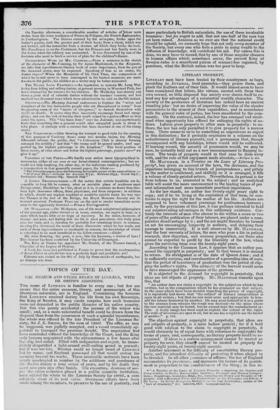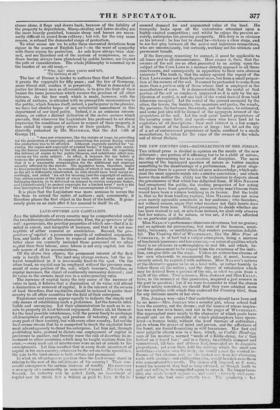LITERARY PROPERTY.
LITERARY men have been treated by their countrymen as boys, according to JUVENAL, treat peacocks,—they praise them, and
pluck the feathers out of their tails. It would almost seem to have been considered that letters, like virtues, carried with them their own reward, so little disposed has society ever shown itself to ex tend any fair advantages of a substantial worldly character. The poverty of the professors of literature has indeed been an ancient standing joke : but no desire of improving the value of the slender possessions to the utmost of their capabilities, and in accordance with the general rules of justice, has been manifested by the community. On the contrary, indeed, the law has cramped and strait ened when opportunity has offered for enlarging the rights of au thors. Labour gives property to other men in perpetuity : to authors. the law has only permitted it to give property for a narrow term. There seems to us to be something as ungenerous as unjust in this distinction ; for it probably originates in a reliance on the seductiveness of literary pursuits, and a persuasion that, though accompanied with any hardships, letters would still be cultivated. If learning waned, the security of possession would, we may be sure, be instantly held out as a new encouragement to flagging labour. The terms of property would in that case be done away with, and the rule of full enjoyment made absolute,—Kr7y= is des.
Mr. MAUGHAM, in a Treatise on the Laws of Literary Property*, has given an account of the laws, the decisions, and the
objections belonging to this branch of jurisprudence ; and pithily as the matter is condensed, and skilfully as it is arranged, it fills a volume of closely-printed octavo. Nevertheless, its perusal is far from tedious to us, interested in the subject ; and an analytical table will assist the more unconcerned to the leading topics of pre sent information and more immediate practical importance.
As the law stands, an author has twenty-eight years' right to copy; and if he be living at the expiration of that term, he con tinues to enjoy the right for the residue of his life. Authors are supposed to have vehement yearnings for posthumous honours ; and, by the provisions of this law, it was perhaps intended to hold out countervailing advantages in this sublunary existence. Cer
tainly the interests of men who choose to die within a score Or two of years of the publication of their labours, are placed under a com
parative disadvantage by it ; and the act might therefore be termed an act for encouraging longevity in authors, and delaying their passage to immortality. It is well observed by Mr. MAUGHAM, that the best servants of letters, the men who pass a life in patient research, slow digestion, and anxious preparation, are those who cannot be expected to profit by the liberality of the law, which gives the surviving term over the twenty-eight years.
According to the Common Law, it appears that an author possessed the copyright in perpetuity ; and to that tenure it is desired to return. Its abridgment is of the date of Queen Anne ; and it is sufficiently curious, and corroborative of a preceding idea of ours, that the period of luxuriance of production was the period of clipping the author's rights. The certainty of the harvest would seem to have encouraged the oppression of the growers.
It is objected to the demand for copyright in perpetuity, that ideas are not objects of property. Mr. MAUGHAM remarks upon this, that
"An author does not claim a copyright in the subject on which he has written, but in the composition which he has produced on that subject. In the cases which have been decided regarding the piracy of copyright, it is repeatedly laid down that ' the subject' of literary compositions is open to all writers ; but that no one must seize and appropriate to him
self the labour bestowed by another. He may avail himself of it as a guide
to the sources from whence the result was derived—to the mine where the raw material may be found, but he cannot take the manufactured ar ticle. A lively image has been used to explain the extent of the right. The wells of literature are open to all, but no one has aright to use the bucket of another." p. 182.
The objection against copyright in perpetuity, that ideas are not subjects of property, is a mere hollow pretext ; for if it held good with relation to the claim to copyright in perpetuity, it would obviously be of equal force with reference to copyrights for terms of years, and, consequently, no literary property could be re cognized. If ideas in a certain arrangement cannot be treated as property for ever, they clearly cannot be treated as property for twenty-eight years, or twenty-eight seconds. Another argument is the difficulty of ascertaining literary property, and the attendant diftieulty of protecting it when alleged to be invades!. In all other provinces of offence, the law of England accumulates its provisions, and increases the terrors of its punishment in proportion to the assailableness of the tiring ; in this in
*" A Treatise on the Laws of Literary Property, comprising the Statutes and Cases relating to Books, Manuscripts, Lecture, Dramatic anti lyirsical ComposiCons ; Engravings, Sculpture, Maps, Sc.,Mello:inn the Piracy an Transfer of Copyright t with a Historical Vies-, and Disquisitions 'on the Principles anct Effects of the Laws. By Robert .1.11;.ughurn, Secretory to tie Law Isrstitratieu ; author of the 'Law of Attorneys," Sc, Imition, 1828, Longulan and Co.
stance alone, it flags and draws back, because of the liability of the property to depredation. Sheep-stealing and horse-stealing are the more heavily punished, because sheep and horses are necessarily difficult to guard from robbery ; but wit, for the very same reason, is refused the demanded range of protection.
To what cause are we to refer these unwonted deviations from rigour in the course of English Law ?—to the want of sympathy with those crying for protection. As eels have always been skinned, and are therefore out of the custom of compassion, so authors having always been plundered by public licence, are beyond the pale of consideration. The whole philosophy is summed up in the burden of an old song,—
" Why, lad ! when you're used to't, 'Tis nothing at all."
The law of France is kinder to authors than that of England— it grants the copyright for fifty years ; and the law of Germany, more liberal still, confers it in perpetuity. What is demanded in justice for literary men in all countries, is to give the fruit of their brains the same protection which secures the produce of all other labours. As the free work which is made, however, with the rights of authors, is attended with no perceptible inconvenience to the public, which fancies itself, indeed, a participator in the plunder, we have but slender hopes of any substantial amendment in this department of our legal polity. Indeed, it is an ominous circumstance, or rather a distinct indication of the males aninzus which prevails, that wherever the Legislature has professed to set about improving the conditions of authors in respect of their property, it has ended by some paltry stroke at their pockets. Thus, it is shrewdly remarked by Mr. MAUGHAM, that the Act 54th of George III. . . . . " does not commence, like the statute of Anne, by providing for the protection of copyright, and prescribing the period during which the protection was to be afforded. Although expressly entitled for 'securing the copies and copyright of printed books, it begins with repeal. tug the former enactments by the 8th Anne and 41st Geo. III, regarding the delivery of copies to the public libraries, and substitutes other provisions on the same subject. In effect, it imposes the tax before it bestows the protection. In support of the exaction it has been urged, that it is a reasonable compensation for the additional and superior security afforded by the statute. The legislative boon, therefore, ought to havepreceded the duty, in consideration of which it was imposed. But as the act is differently constructed, its title should have been varied accordingly, and called 'An act for securing (not the copyright of authors, but) eleven copies of the whole of every book, with all maps and prints belonging thereto, to be delivered on demand to certain corporate bodies, and [subordinately] to protect copyright for a limited tcrm :' such is the true description of this last act for 'the encouragement of learning.' "
It is plain that the Legislature was more anxious to secure the tax than to extend the rights of authors ; and, consistently, it therefore places the first object in the front of the battle. It generously gives us an inch after it has assured to itself its ell.















 Previous page
Previous page